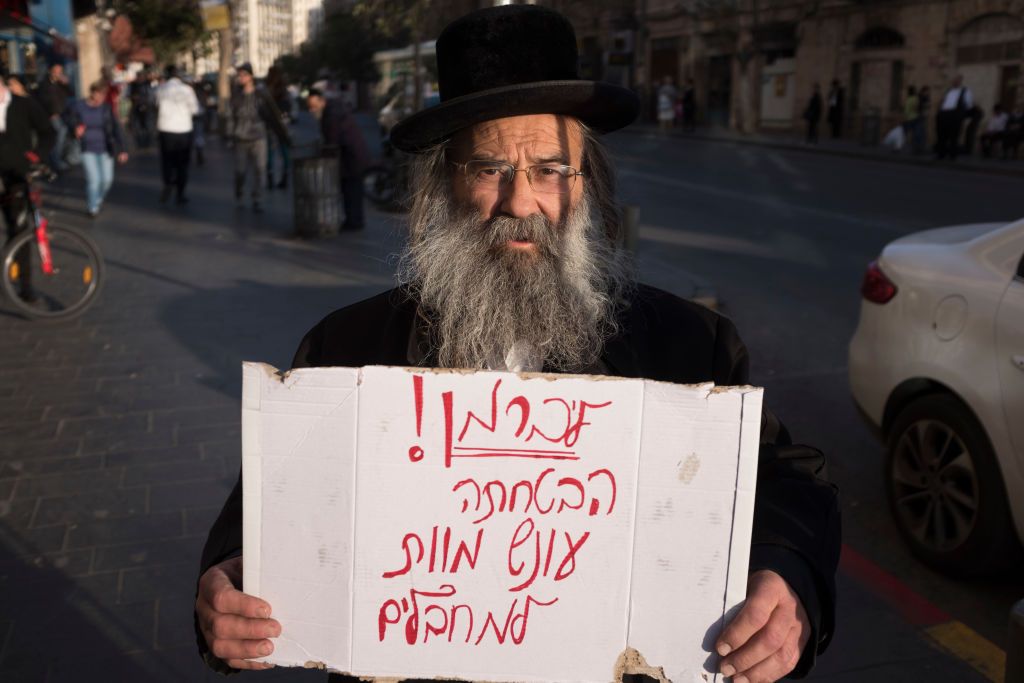One of the many problems with the effort to bring back the death penalty in Israel is that it never went away in the first place. Israel is only a partial abolitionist, banning the death penalty for ordinary crimes in 1954 but retaining it for war crimes and offences against the state. The last execution was in 1962, when Eichmann was sent on his merry way. Capital punishment technically remains in place but a mixture of procedural rules and queasiness about its use have prevented any further trips to the gallows.
That may be about to change after a ‘death penalty for terrorists’ bill passed its first reading in the Knesset. Terrorists already risk the death penalty; the bill simply drops the requirement for the three-judge panel to be unanimous in its sentencing. The bill is the work of Avigdor Lieberman’s Yisrael Beiteinu, a small right-wing outfit but a lynchpin in Benjamin Netanyahu’s fragile coalition government. Lieberman is the sort who gives rabble-rousing a bad name: he has prospered by talking tough on Palestinian terrorism and Israeli-Arab extremism. The best that can be said for his targets is that they have always been generous in supplying him material.
A series of brutal attacks on Israeli families in Neveh Tzuf, Kiryat Arba, and Itamar have helped Lieberman’s campaign to bring back the death penalty. Public sympathy for capital punishment is high because there is effectively no life sentence for terrorists, while Israel has released thousands of Palestinian prisoners over the years – either in exchange for hostages or as part of the peace process. To secure the 2011 release of kidnapped IDF soldier Gilad Shalit, Israel freed more than 1,000 Palestinian inmates collectively responsible for 569 civilian deaths.
Yisrael Beiteinu’s bill is far from a done deal. It still has three more readings to go and even then would have to contend with an activist Supreme Court. Netanyahu corralled government members to vote for the bill, two years after he corralled them to vote against its predecessor. All is positioning with Bibi: he writes books so he has somewhere to keep his principles.
All the same, the Knesset should abandon this ill-conceived legislation sooner rather than later. Many of the arguments are not new. Capital punishment is inhumane, an over-reach of state power, and confuses vengeance for justice. There is no conclusive evidence that it deters murder. It puts the innocent at risk of execution. (Since 1973, 161 Americans have been exonerated while on death row.) Lieberman points to the United States as another advanced country with capital punishment but America is moving away from the death penalty: death sentences are down from roughly 300 two decades ago to just 39 last year and public support is at its lowest level since 1972.
Applying capital punishment to Palestinian terrorism amplifies these problems. Death is hardly a deterrent for militants who plan to die along with their victims or who factor it in as a possible outcome. Terrorists already risk being shot by security forces, so if death deters some, it has no effect on others. It may even be a perverse incentive. Those who long for martyrdom but don’t have the guts for self-detonation could butcher a family of Jews, be awarded a quick death, and still get the glory of expiring at the hands of the Zionist enemy. It would be an altogether cleaner form of suicide-bombing.
By far, the most troubling aspect of the bill is that it would apply only to military courts in Judea and Samaria, meaning the death penalty would be in effect a Palestinian-only punishment. Even with deference to the political, legal and security complexities Israel faces, it cannot have a capital sentence that applies only to one nationality. One Arab lawmaker asked if Netanyahu supported death for Israeli terrorists, to which the PM replied, ‘In principle, yes’. Chief Rabbi Yitzhak Yosef has pointed out the incompatibility of this position with Jewish religious law but the secular problems are no less pressing.
Would the death sentence apply only to Israelis living in Judea and Samaria? What if a Jewish terrorist from Rehovot kills a Palestinian in Ras Karkar then returns home? Would they be tried in civilian or military court? Or is it the position of the Likud that settlers should be punished more severely than the rest of the population? And what of Israeli Arabs? Does the Palestinian who kills one Jew get death but the Arab citizen who kills ten get to live?
Israel does not consider itself an occupier in Judea and Samaria, so why does it act like one? Imposing a death penalty on terrorists of one nationality is the act of an occupier. Operating a dual justice system for two sets of civilians under its control is the act of an occupier. Israel can’t be Belgium in Haifa and Belarus in Hebron.
The freeing of the territories in 1967 was one of the great moments in Jewish history, Jerusalem reunited and the Land of Israel liberated against all the odds. Five decades on, Israel sullies that victory by behaving like a stranger in a strange land. Israel does not need a conversation about the death penalty. It needs a conversation about Israel, where its borders lie, and what it intends to do with the territories.







Comments